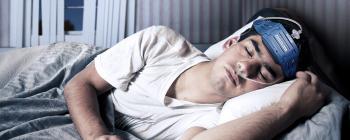Home Sleep Testing for Commercial Drivers at Risk For Sleep
June 18, 2019

Obstructive Sleep Apnea and Commercial Drivers
Obstructive Sleep Apnea is a condition that makes you stop breathing for short periods while you are asleep. People with sleep apnea do not get good-quality sleep, so they are often tired and not alert. This puts them at risk for car accidents and other types of accidents. In fact, getting less than six hours of quality sleep a night is like have two beers on board when it comes to reaction times and judgement. Plus, studies show that people with sleep apnea are more likely than others to have high blood pressure, heart attacks, and other serious heart problems. In people with moderate to severe sleep apnea, getting treated (for example, with a CPAP machine, or an oral appliance) can help prevent some of these problems.
Which drivers need to be tested for Sleep Apnea?
All drivers with a BMI greater than or equal to 40.
All drivers with a BMI greater than or equal to 33 with 3 or more of the following:
- Hypertension (treated or untreated)
- Type 2 diabetes (treated or untreated)
- History of stroke, coronary artery disease, or arrhythmias
- Small or recessed jaw
- Loud snoring
- Witnessed apneas (episodes of stopped breathing followed by a gasp)
- Mallampati Classification of Class 3 or 4 (classification of how open the back of the throat appears when you say “Ahh”)
- Neck size > 17 inches (male), 15.5 inches (female)
- Hypothyroidism (untreated)
- Age 42 and above
- Male or post- menopausal female
Sleep apnea is diagnosed with a sleep study. Here at Champlain Medical Urgent Care we offer a two night, in-your-home, sleep testing on Tuesdays and Fridays. We test for sleep apnea using the ARES Home Sleep Test. It is very lightweight, has an adjustable head strap, and is easy to use. Our in-home sleep test has a total cost of $425.00 and can be billed through most insurances. In-hospital sleep studies can cost patients over $2,000.
You will be asked to wear the machine for two consecutive nights so we can get an accurate reading. At night, the device rests on your forehead and you will have cannula tips in your nose and a soft band around your neck. The band needs to remain on your neck while you are going through the testing for two days and our staff will remove it for you when you return the machine.
The cannula tips do not supply you with oxygen. They measure the amount of oxygen your body is taking in while you sleep. These need to stay in your nose throughout the night or the machine will not function properly.
After two nights of sleep, you return the ARES to our office, when our staff will remove your neck band and upload your information to the ARES portal. Your sleep report will be reviewed by a sleep medicine specialist and the result will be sent to our office. The process usually takes between 2 to 7 business days.
Using the home sleep test allows avoiding months long waiting for an in-hospital sleep study. The at-home test costs much less and gives reliable information to diagnose sleep apnea acceptable to the DOT for drivers, or to others who have indications of being at risk.
We participate with most insurance carriers, but not Green Mountain care. And, you do not need to have had your DOT Medical Exam in our office to be able to use our in- home testing.
If you have any questions, please feel free to email staff@champlainmedical.com or call 802-448-9370.